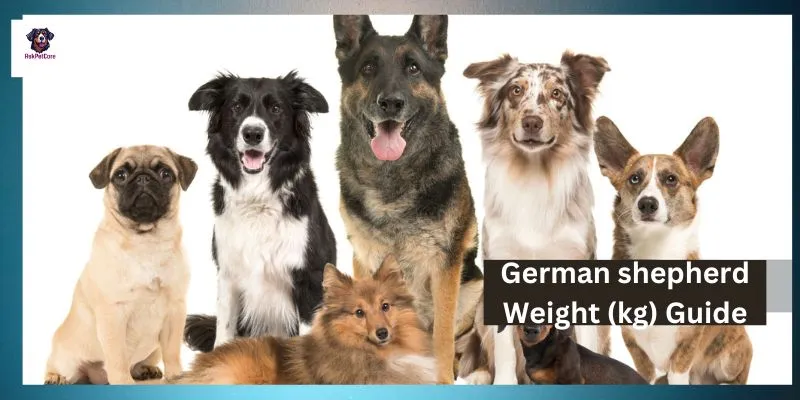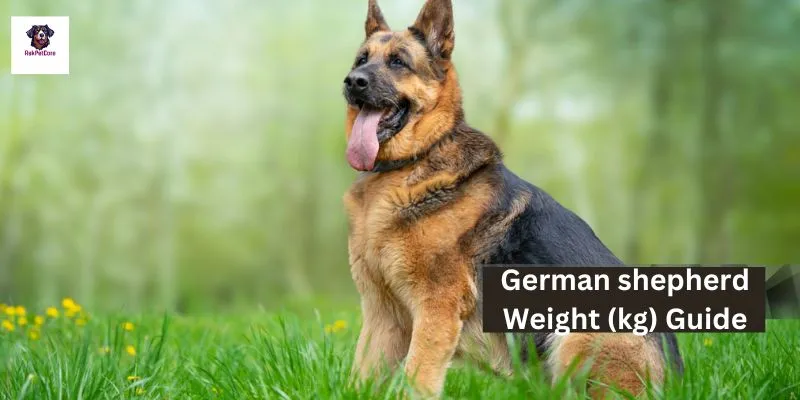Healthy Growth: German Shepherd Weight by Age and Gender
Today I will explain German shepherd Weight (kg).
Hey there, dog lovers! Let’s talk about one of the coolest dog breeds out there: German Shepherds! These furry friends are super popular for their loyalty and smarts. But you know what’s also important? Understanding how much they weigh. Yep, knowing your German Shepherd’s weight is key for keeping them healthy and happy. Now, you might be wondering, ‘How much should my German Shepherd weigh?’ It’s a common question, and we’re here to help answer it. Stick around as we dive into everything you need to know about German Shepherd weight.

Firstly Understand the German Shepherd Growth phenomenon:
Alright, let’s break down how German Shepherds grow from cute little puppies to majestic adults. So, these pups start off tiny and adorable, but they grow pretty fast! It’s like they have a turbo button or something. Now, when it comes to how much they weigh, it’s not just about how many treats they gobble up. Nope, genetics play a big role, along with what they eat and how much they move. And here’s the thing: keeping an eye on their weight isn’t just about vanity. Nope, it’s super important for their overall health and happiness. So, let’s dive into why monitoring their weight is a big deal.
Now Explore Average German Shepherd Weight By Age And Gender:
“Okay, let’s get down to the nitty-gritty: how much should your German Shepherd weigh at different ages and depending on whether they’re a boy or a girl? We’ve got the scoop! Check out this handy table below that breaks down the average weights for male and female German Shepherds as they grow up. Remember, these are just averages, so your furry friend might be a bit heavier or lighter. It’s all part of what makes them unique.

| Age (months) | Male Weight (kg) | Female Weight (kg) |
| 1 | 6-9 | 5-8 |
| 2 | 10-14 | 9-13 |
| 3 | 15-20 | 14-18 |
| 4 | 20-25 | 18-22 |
| 5 | 25-30 | 22-26 |
| 6 | 28-34 | 25-30 |
| 7 | 30-36 | 28-33 |
| 8 | 32-38 | 30-35 |
| 9 | 34-40 | 32-37 |
| 10 | 36-42 | 34-39 |
| 11 | 38-44 | 36-41 |
| 12 | 40-46 | 38-43 |
| 13 | 42-48 | 40-45 |
| 14 | 44-50 | 42-47 |
| 15 | 45-52 | 44-49 |
| 16 | 46-54 | 45-51 |
| 17 | 47-56 | 46-53 |
| 18 | 48-58 | 47-55 |
| 19 | 49-60 | 48-57 |
| 20 | 50-62 | 49-59 |
| 21 | 51-64 | 50-61 |
| 22 | 52-66 | 51-63 |
| 23 | 53-68 | 52-65 |
| 24 | 54-70 | 53-67 |
Remember, these are general guidelines, and individual dogs may fall outside these ranges based on factors such as genetics, diet, and exercise. Always consult with a veterinarian for specific advice about your dog’s weight and health.

If you like to read more about German shepherds read my articles.
german-shepherd-colors-best-20-worldwide-colors:
Top of Form
Now Understand Factors Influencing German Shepherd Weight:
let’s dig deeper into what can make your German Shepherd weigh a little more or a little less than the average. It’s not just about how much they eat—although that’s part of it. Other stuff matters too, like making sure they get the right kind of food and enough exercise. Oh, and don’t forget those check-ups with the vet! Regular visits can catch any health issues early on. Now, if you want to keep your furry friend feeling great, here are some tips: make sure they’re chowing down on good quality food, keep them active with plenty of walks and playtime, and stay on top of those vet appointments. Your German Shepherd will thank you with wagging tails and lots of love.

Now Understand How to Monitor Your German Shepherd’s Weight:
Keeping an eye on your German Shepherd’s weight is super important for their health. Here are some easy ways you can do it at home:
Use a Scale: Get a scale made for pets and weigh your dog regularly, like once a week.
Body Check: Feel around your dog’s ribs, spine, and waistline. If you can easily feel their ribs without seeing them, and they have a bit of a waist, that’s a good sign.
Keep a Record: Write down your dog’s weight and any changes you notice. That way, you can track things over time.
Why Talk to a Vet?
If you notice anything weird, like your dog gaining or losing weight suddenly, it’s best to chat with your vet. They can check for any health issues and give you advice on what to do next. Remember, your vet’s always there to help keep your furry friend healthy and happy.

Conclusion:
Alright, let’s wrap it up! We’ve covered a lot about German Shepherd weight and growth, so here are the main takeaways:
It’s super important to keep an eye on your German Shepherd’s weight as they grow. It helps keep them healthy and happy.
Don’t forget to use a scale, do body checks, and keep track of any changes in weight.
And hey, if you ever have any concerns, don’t hesitate to reach out to your vet. They’re there to help!
Remember, being a responsible pet owner means understanding and managing your dog’s weight. So keep up the good work, and give your furry friend some extra belly rubs for being such an awesome companion.
Now understands German shepherd weight (kg):

Here’s a general guideline for the weight of German Shepherds from one to twenty-four months, separated by gender. These are approximate averages, and individual dogs may vary.
Firstly Male German shepherd Weight (kg):
| Age (months) | Weight (kg) |
| 1 | 6-9 |
| 2 | 10-14 |
| 3 | 15-20 |
| 4 | 20-25 |
| 5 | 25-30 |
| 6 | 28-34 |
| 7 | 30-36 |
| 8 | 32-38 |
| 9 | 34-40 |
| 10 | 36-42 |
| 11 | 38-44 |
| 12 | 40-46 |
| 13 | 42-48 |
| 14 | 44-50 |
| 15 | 45-52 |
| 16 | 46-54 |
| 17 | 47-56 |
| 18 | 48-58 |
| 19 | 49-60 |
| 20 | 50-62 |
| 21 | 51-64 |
| 22 | 52-66 |
| 23 | 53-68 |
| 24 | 54-70 |
Female German Shepherd Weight (kg):

| Age (months) | Weight (kg) |
| 1 | 5-8 |
| 2 | 9-13 |
| 3 | 14-18 |
| 4 | 18-22 |
| 5 | 22-26 |
| 6 | 25-30 |
| 7 | 28-33 |
| 8 | 30-35 |
| 9 | 32-37 |
| 10 | 34-39 |
| 11 | 36-41 |
| 12 | 38-43 |
| 13 | 40-45 |
| 14 | 42-47 |
| 15 | 44-49 |
| 16 | 45-51 |
| 17 | 46-53 |
| 18 | 47-55 |
| 19 | 48-57 |
| 20 | 49-59 |
| 21 | 50-61 |
| 22 | 51-63 |
| 23 | 52-65 |
| 24 | 53-67 |
This table shows the average height and length ranges for German Shepherd dogs from 1 to 24 months of age:

| Age (months) | Height Range (inches) | Length Range (inches) |
| 1 | 16 – 20 | 16 – 20 |
| 2 | 18 – 22 | 18 – 22 |
| 3 | 20 – 24 | 20 – 24 |
| 4 | 22 – 26 | 22 – 26 |
| 5 | 24 – 28 | 24 – 28 |
| 6 | 24 – 28 | 24 – 28 |
| 7 | 24 – 30 | 24 – 30 |
| 8 | 24 – 30 | 24 – 30 |
| 9 | 24 – 32 | 24 – 32 |
| 10 | 24 – 32 | 24 – 32 |
| 11 | 24 – 32 | 24 – 32 |
| 12 | 24 – 32 | 24 – 32 |
| 13 | 24 – 34 | 24 – 34 |
| 14 | 24 – 34 | 24 – 34 |
| 15 | 24 – 34 | 24 – 34 |
| 16 | 24 – 34 | 24 – 34 |
| 17 | 24 – 36 | 24 – 36 |
| 18 | 24 – 36 | 24 – 36 |
| 19 | 24 – 36 | 24 – 36 |
| 20 | 24 – 36 | 24 – 36 |
| 21 | 24 – 38 | 24 – 38 |
| 22 | 24 – 38 | 24 – 38 |
| 23 | 24 – 38 | 24 – 38 |
| 24 | 24 – 38 | 24 – 38 |
Please note that these ranges are averages and individual dogs may vary. Always consult with a veterinarian for concerns regarding your dog’s growth and development.

I hope you will thoroughly understand German shepherd Weight (kg), still, any quarry contact me.
- Question: How big do German Shepherds get?
German Shepherds typically reach a height of 22 to 26 inches and a weight of 50 to 90 pounds.
- Question: What is the average lifespan of a German Shepherd?
The average lifespan of a German Shepherd is around 9 to 13 years.
- Question: Are German Shepherds good family dogs?
Yes, German Shepherds are known for being loyal, intelligent, and protective, making them excellent family dogs when properly trained and socialized.
- Question: How much exercise does a German Shepherd need?
German Shepherds require at least 1-2 hours of exercise per day to stay healthy and happy, including activities like walking, running, and playing.
- Question: Do German Shepherds shed a lot?
Yes, German Shepherds are moderate to heavy shedders, especially during shedding seasons in the spring and fall. Regular grooming can help manage their shedding.
Disclaimer: I hope you will be satisfied if still have any queries contact me. thanks. This is my personal information you must contact your vet for more.
Here are some reference books that are considered authoritative on the topic of dog care, including nail care:
- “The Complete Dog Owner’s Manual” by Dr. Bruce Fogle
- “The Ultimate Guide to Dog Care: Everything You Need to Know to Keep Your Dog Happy and Healthy” by Amy Marder and Andrew Luescher
- “The Veterinarians’ Guide to Natural Remedies for Dogs: Safe and Effective Alternative Treatments and Healing Techniques from the Nations Top by Martin Zucker
